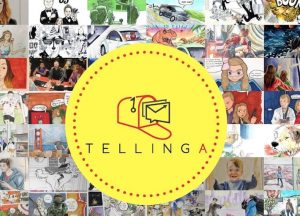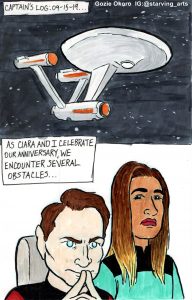Mailbox Storyboard Startup MBA Student Combines Digital & Analog for Greeting Cards by Mail
Mailbox Storyboard Startup: a new personal service has been born in  Houston, Texas to give stories to friends, relatives and colleagues to delight them by receiving hand drawn greetings through the mail.
Houston, Texas to give stories to friends, relatives and colleagues to delight them by receiving hand drawn greetings through the mail.
Tellinga (telling-a-story) is a web-based mailbox storyboard startup that grew from founder Alex Kurkowski’s frustration of never finding handwritten letters in his mailbox, but only bills and junk mail. He says, “Tellinga offers a way to tap back into the tangible and traditional by providing a product that you can touch and feel on a deeper level rather than staring at another screen.”
Alex was immersed in an MBA at Rice University in Houston, when he noticed that all his free time started to slip away, and so did a lot of his relationships with friends and family. To keep in touch, he says, “I started  snail mailing them epistolary (literary/artisanal work in the form of letters) style illustrations. I would draw pictures in story form and snail-mail them to loved ones, piece by piece over time.” He added, “My family and friends enjoyed these stories because they were goofy and they were always drawn as the main characters in their own personalized “mailbox storyboard“.
snail mailing them epistolary (literary/artisanal work in the form of letters) style illustrations. I would draw pictures in story form and snail-mail them to loved ones, piece by piece over time.” He added, “My family and friends enjoyed these stories because they were goofy and they were always drawn as the main characters in their own personalized “mailbox storyboard“.
After telling college friends and receiving enthusiastic encouragement, Alex transformed his activity into a live mailbox storyboard startup, called Tellinga, at the end of 2018. In less than a year since then, Tellinga has produced over 1600 illustrations for hundreds of clients as well as using the services of more than two dozen artists—many of whom are art students at Rice and other Texas colleges.
The way that Tellinga works for the user is like this:
-
Select a story length; the options are one day, one week, two weeks, or one month—priced from $9.99 to $69.99;
-
Upload a photo and add a description of your desired story (reminisce a memory from your past or create a brand new story);
-
Tellinga’s team of illustrators and artists will start working on the story;
-
A few days later, the designated recipient of the story will start receiving unique hand-drawn greeting card-sized illustrations every other day in their mailbox until the package ends.
The Business Significance of Tellinga, the Mailbox Storyboard Startup
The Tellinga mailbox storyboard startup is very significant. On several fronts.
The greetings card market is large, but still has space: mass-produced printed greetings cards cost between 50 cents and ten dollars, in a market that is still worth about $7.5 billion in the US (a figure much quoted), according to the Greeting Card Association. However IBIS, the market research firm, is more conservative and forecasts the figure for 2019 going down to $5 billion. This is attributed particularly to the growth of the what they call ‘paperless substitutes’. Whatever the size of the market, it remains significant, despite being dominated by the big two competitors, Hallmark and American Greetings.
Shutterfly, with revenues of some $2 billion are big in the market with customized cards with photos and text, as well as their many other consumer and business offerings. There are many other competitors in the space of online photo printing, including generalists like Amazon and Walmart. There are specialists in the game, too, with names like Zazzle, Shoebox, Snapfish, Mixbook and many others. Shutterfly and Snapfish were both acquired by Apollo Global Management in 2019 and will be merged. Several of them are heavily discounting their card products now, and Shoebox closed in June 2019.
Normally, such an apparently competitive market space might deter new entrants, but Alex worked from instinct, identifying that he could fulfill that yearning place we all have for directly compassionate human interaction—in the card market—to create his mailbox storyboard startup, Tellinga.
The eCard and paperless market goes only so far: The market for ecards is estimated by Card Gnome CEO, Joel Wishkovsky, amount to only $100 million or so, and there seems to be no data on whether either part of the total market is growing or declining. His product, incidentally, sells at $4.99, but only the greeting is customized.
There are many offers out there, each with their own special claims to be different. Even the $4 billion Hallmark offers eCards now, as does American Greetings. The British firm, Jackie Lawson, maybe the best-known in the field, started her eCard business back in 2002.
The eCard business has specialist sub-markets, as well. For example, Power eCard allows executives in large corporations to personalize their Christmas cards to clients and suppliers, right from their browser. The firm eCards2go offers the same service.
While paperless card producers do indeed offer personalized cards, Tellinga offers that and more. Their offerings convey implicit meanings that normally that normally only come through face-to-face or physical interactions.
Innovation in the market is mainly technical and digital: Innovation in the market has been growing. Apart from Alex at Tellinga, there is Lovepop, founded by best friends and naval architects, John Wise and Wombi Rose, Lovepop that creates laser-cut pop-up cards designed on shipbuilding software and handcrafted in the ancient art form of kirigami (a variation of origami that includes cutting of the paper, rather than solely folding it). They have received a $12.5 million investment by Highland Capital Partners.
While the production process may be new, the 3D card company, Up With Paper has been around for 30 years or more, who call themselves ‘the original pop-up greeting card company”. They have just introduced a card with LED, so they are busy innovating, too. The LED circuitry, by the way, is printed right onto the card.
Exciting as such developments are, and they certainly bring pleasure to recipients, they still fail to touch deep sensitivity. Tellinga products, on the other hand, can speak unsayable meanings.
Connections—for real
Even four years ago, “On paper or via email, today’s greeting cards are mass-produced, impersonal and downright cheesy”, said Inc Magazine writer, Larry Kim, in an article about the business.
This is where Tellinga is telling-a different story. Realizing that many people, and particularly millennials (born between the early 80s and 90s) are feeling detached, and frustrated, by the intermediation of social media and the daily pervasive presence of everything digital. Sitting isolated by a digital screen gets in the way of the often difficult to express sentiments we have for one another.
Tellinga is using the best of digital to create an intimate way of offering greetings, congratulations, or sympathies to friends, family and colleagues. The startup has identified an opportunity, which is growing in step with the impersonal nature of so many electronic and formal forms of communication. What founder Alex says is that Tellinga offers personalized greeting cards that tell your story. That is the ‘grab’ of the business that resonates with those of us who find it hard to find printed or paperless cards that convey our real message.
He has found a way to use the wonderful features of our digital life combined with the analog or experiential needs we have had for ever. Keep your eye on Alex Kurkowski! A lot of startup tadpoles grow into in to big frogs.
When he completes his MBA, Alex has plans to integrate a sharing economy model into Tellinga in an effort to streamline the onboarding of aspiring artists and writers. The writers will create love letters, poems, or fun narratives which will be paired with the illustrations to more fully tell the stories that people want to share. He is purposefully imagining that his mailbox storyboard startup will grow in sales, but more significantly grow in ideas—of the kind of business that blossoms. It will demonstrate that business can fully live connection, trust and love.






